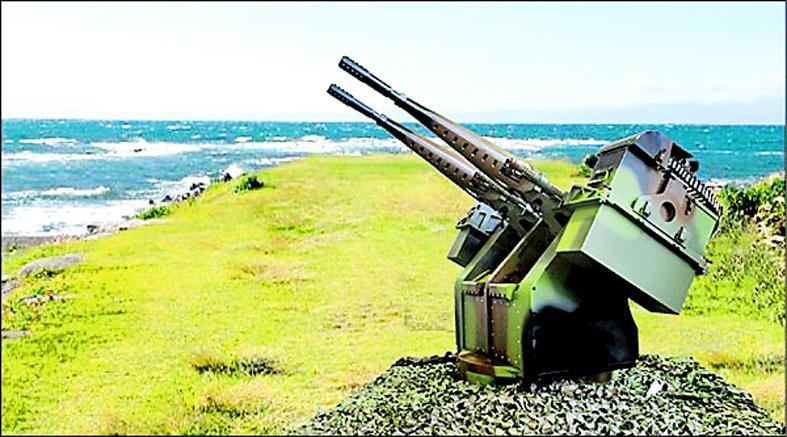The deployment of new short-range automated defense systems on two outlying islands is running ahead of schedule and is to be completed by the end of this year at the latest, the military said in a briefing to lawmakers.
The army and navy have purchased six sets of the short-range weapons systems to be in part deployed on Lienchiang County’s Dongyin Island (東引) and Kinmen County’s Wuchiu Island (烏坵).
The Chinese-language United Daily News (UDN) yesterday reported that the Wuchiu system is expected to be deployed by June, while the system in Dongyin should become operational by the end of this year.

Photo: Screen grab from Chungshan Institute of Science and Technology’s Web site
News of the early deployment schedule came weeks after a Chinese civilian aircraft on Feb. 5 flew near Dongyin in a move widely interpreted as a provocation or test of Taiwan’s combat readiness.
The systems are based on the locally produced T-75 20mm autocannon, with the option of the single-barrel XTR-101 or twin-barrel XTR-102, the Ministry of National Defense said previously of the purchase.
It can be used on land, or mounted on vehicles or ships, as well as remotely controlled to ensure operational safety.
Equipped with image recognition, target locking, ballistic correction and fire-control tracking, the system ensures “fast, fierce, vicious and accurate” firepower, greatly enhancing the military’s short-range defense capabilities, the newspaper quoted the Chungshan Institute of Science and Technology as saying.
The UDN quoted the Navy Command as saying in the report to the Legislative Yuan that testing of four weapons systems was completed by Oct. 8 last year, while construction and electrical installations at the site were completed by December.
Originally scheduled to become operational by the end of this year, the navy said it moved the deployment of the Wuchiu system forward to June.
Construction work on Dongyin was completed last month, the Army Command Headquarters said.
The system is expected to be moved to the island between next month and July, and installed in August and September, the UDN cited the report as saying.
Training would be conducted in September for final checks by October or November, it added.

INVESTIGATION: The case is the latest instance of a DPP figure being implicated in an espionage network accused of allegedly leaking information to Chinese intelligence Democratic Progressive Party (DPP) member Ho Jen-chieh (何仁傑) was detained and held incommunicado yesterday on suspicion of spying for China during his tenure as assistant to then-minister of foreign affairs Joseph Wu (吳釗燮). The Taipei District Prosecutors’ Office said Ho was implicated during its investigation into alleged spying activities by former Presidential Office consultant Wu Shang-yu (吳尚雨). Prosecutors said there is reason to believe Ho breached the National Security Act (國家安全法) by leaking classified Ministry of Foreign Affairs information to Chinese intelligence. Following interrogation, prosecutors petitioned the Taipei District Court to detain Ho, citing concerns over potential collusion or tampering of evidence. The

Seventy percent of middle and elementary schools now conduct English classes entirely in English, the Ministry of Education said, as it encourages schools nationwide to adopt this practice Minister of Education (MOE) Cheng Ying-yao (鄭英耀) is scheduled to present a report on the government’s bilingual education policy to the Legislative Yuan’s Education and Culture Committee today. The report would outline strategies aimed at expanding access to education, reducing regional disparities and improving talent cultivation. Implementation of bilingual education policies has varied across local governments, occasionally drawing public criticism. For example, some schools have required teachers of non-English subjects to pass English proficiency

‘FORM OF PROTEST’: The German Institute Taipei said it was ‘shocked’ to see Nazi symbolism used in connection with political aims as it condemned the incident Sung Chien-liang (宋建樑), who led efforts to recall Democratic Progressive Party (DPP) Legislator Lee Kun-cheng (李坤城), was released on bail of NT$80,000 yesterday amid an outcry over a Nazi armband he wore to questioning the night before. Sung arrived at the New Taipei City District Prosecutors’ Office for questioning in a recall petition forgery case on Tuesday night wearing a red armband bearing a swastika, carrying a copy of Adolf Hitler’s Mein Kampf and giving a Nazi salute. Sung left the building at 1:15am without the armband and apparently covering the book with a coat. This is a serious international scandal and Chinese

TRADE: The premier pledged safeguards on ‘Made in Taiwan’ labeling, anti-dumping measures and stricter export controls to strengthen its position in trade talks Products labeled “made in Taiwan” must be genuinely made in Taiwan, Premier Cho Jung-tai (卓榮泰) said yesterday, vowing to enforce strict safeguards against “origin laundering” and initiate anti-dumping investigations to prevent China dumping its products in Taiwan. Cho made the remarks in a discussion session with representatives from industries in Kaohsiung. In response to the US government’s recent announcement of “reciprocal” tariffs on its trading partners, President William Lai (賴清德) and Cho last week began a series of consultations with industry leaders nationwide to gather feedback and address concerns. Taiwanese and US officials held a videoconference on Friday evening to discuss the